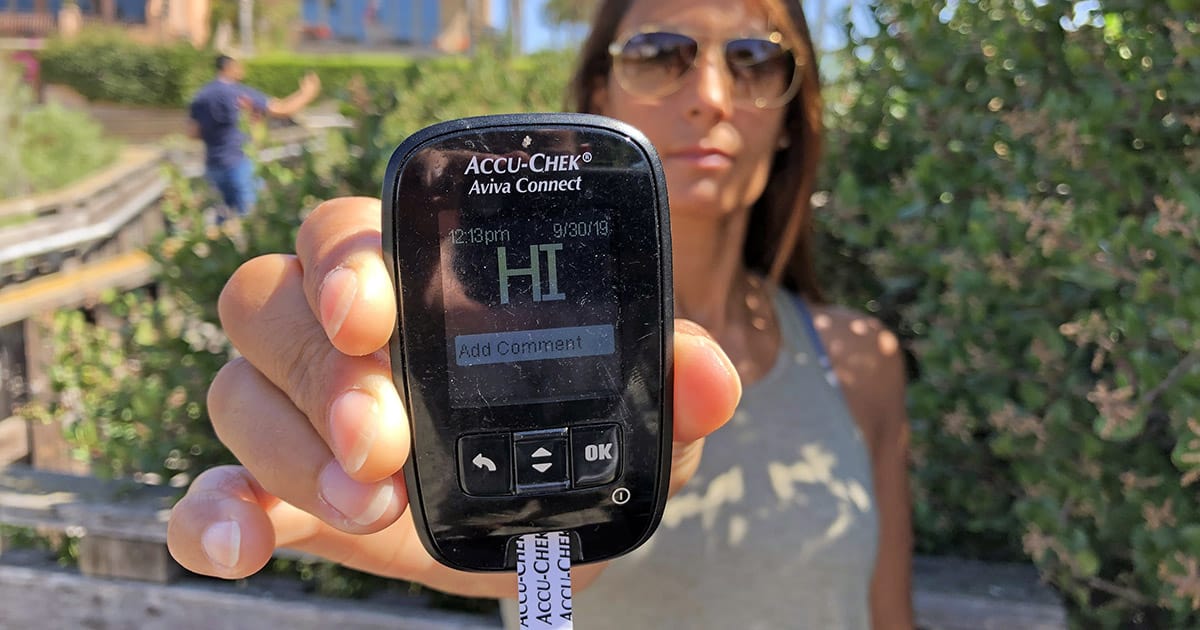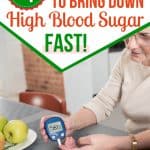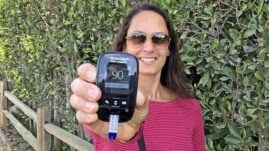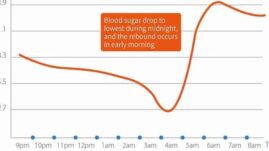Everyone living with diabetes is bound to experience high blood sugars (hyperglycemia) sometimes. There are simply too many variables out of our control to prevent high blood sugars from ever happening.
But the best thing we can do when blood sugar spikes happen is to help them come down into a normal range as quickly as possible.
Here are four things you can do to bring a high blood glucose level down quickly.

If you take insulin…
For people with diabetes who take insulin, insulin will always play a major role in how you correct a high blood sugar. There are several things to keep in mind when you use insulin to correct a high blood sugar.
First, check your ketones
If you live with insulin-dependent diabetes, high blood sugars can put you at risk of developing ketones. Blood sugar levels over 250 mg/dL (13.9 mmol/L) with too little insulin can quickly turn into diabetic ketoacidosis (DKA) if it continues to rise.
Test your urine for ketones, and contact your doctor or visit an urgent care facility if you measure with “moderate to large” ketones.
When large ketones are present, correcting a high blood sugar with insulin via pump or injection won’t be effective. Instead, you’ll likely need intravenous fluids for a few hours to restabilize.
If you only have moderate ketones or less, you may be able to correct with insulin at home, but you’ll likely need a larger dose than normal. Contact your healthcare team if you test positive for ketones and are unsure of how to safely manage the situation.
You can learn more in our guide: What Levels of Blood Sugar are Dangerous
Take a correction insulin dose
For those who take fast or rapid-acting insulin (Novolog, Humalog, Apidra, Fiasp, Admelog, Afrezza) you can take a “correction” dose to bring a high blood sugar down.
A “correction factor” is determined with support from your healthcare team. This number tells you how much 1 unit of fast or rapid-acting insulin will lower your blood sugar. For example, a correction factor of 1:50 (1:2.8 mmol/L) means that 1 unit of insulin will lower your blood sugar by 50 points (2.8 mmol/L).
It’s important to keep in mind how much insulin you may already have on board in your bloodstream before taking an additional dose of insulin.
Most fast and rapid-acting insulin stays in your system for approximately 3 to 4 hours, which means taking an additional dose of insulin to correct a high could lead to a severe low blood sugar if you already have a significant amount of insulin from your most recent dose still in your bloodstream.
Also, remember to give that correction dose of insulin at least two hours to make an impact on your blood sugar before getting frustrated and taking another injection. You won’t see a significant improvement in your blood sugar until it’s been in your system for at least 1 to 2 hours (unless you use ultra-fast insulins like Afrezza).
Take an “intra-muscular” injection
Insulin was designed to be injected into body fat, but if your blood sugar is high, injecting that “correction dose” of insulin into muscle can help.
When you inject insulin into muscle, it’s absorbed more quickly. This is not something you should do on a daily basis. It will likely leave bruising, and again, it is not how insulin is supposed to be taken for your everyday insulin needs. But for those severe highs (blood sugar reading over 250 mg/dL), it could be a useful option.
Discuss “intra-muscular” injections with your healthcare team before adding them to your diabetes management regimen.
Consider using inhaled insulin
Afrezza is a rapid-acting inhaled insulin that some people with type 1 or type 2 diabetes find to be very useful for treating high blood sugar levels.
Inhaled insulin is as effective at lowering blood sugar levels as regular insulin but works a lot quicker.
It is probably not going to replace all of your insulin needs, but many are using it in addition to their normal insulin via syringe, pen, or insulin pump because of how quickly it starts working in your bloodstream.
It’s fairly easy to use but the results and experience of using it can differ from person to person.
Ask your healthcare team for more information about Afrezza.
Beware of low blood sugars
Remember, above all else, it’s very easy to over-treat a high blood sugar with insulin and wind up low. Then you’ll be tempted to binge-eat and wind up high again. This blood sugar roller coaster is exhausting — and dangerous, too.
Frequently finding yourself on the blood sugar roller coaster means your approach to taking insulin and/or how you treat low blood sugars isn’t working and needs some fine-tuning. Work with your healthcare team to reduce and prevent these wild swings to ensure your overall safety and quality of life!
Take any missed medications
Your doctor may have prescribed other medications to help keep your blood sugar in a normal range. Check that you haven’t missed a dose.
If you have missed a dose, take it as soon as possible, as long as you don’t “double up” on your medication. This means that if your missed dose was several hours ago and your next scheduled dose is in 1 hour, you shouldn’t take both doses so close together.
Taking two doses on top of each other can cause adverse reactions with some drugs. Instead, just take your next scheduled dose now.
If in doubt, consult the guide on the packaging of the medication or contact your medical team.
Other things you can do
Even if you don’t take insulin, there are several things you can do to bring a high blood sugar down to a healthier range more quickly. Let’s take a look.
Exercise (even just 10 or 15 minutes)
Physical activity can be a very effective method of reducing a high blood sugar.
If you don’t take insulin, exercise can be a very simple approach to reducing high blood sugar levels. Even just a 15-minute walk can have a big impact on your blood sugar.
If you do take insulin, it’s important to know that exercising when your blood sugar is above 250 mg/dL (13.9 mmol/L) and without enough insulin in your system can actually cause your blood sugar to rise further and put you at risk of developing ketones.
If you test positive for ketones using a urine strip, you should not try to lower your blood sugar by exercising. This will only increase your ketone level and put more stress on your body.
First, you’ll need a correction dose of insulin, but if you plan to exercise too, you’ll likely be advised by your healthcare team to reduce the correction dose by 50 to 75 percent to prevent a subsequent low blood sugar.
Drink some water!
Dehydration can cause high blood sugars, which means getting hydrated can help prevent and reduce high blood sugars.
Your blood consists partly of water. When you don’t drink enough water throughout the day, the other things in your blood (like glucose) become more concentrated! And thus, higher blood sugar levels.
You know that uncomfortable thirst you feel when your blood sugars are high? Give in to it. This is how your body helps flush excess sugar out through your urine, and how you replenish the necessary fluid balance in your bloodstream.
Can oral medications help bring down high blood sugar?
While any oral medications you take to help manage your diabetes (like Metformin) do improve your blood sugar levels, they are not something you would take an “extra dose” of to correct an occasional high blood sugar level.
However, if you realize that you forgot to take your dose of a daily medication, this should be part of the process of bringing your high blood sugar down.
Some medications can be taken late, and some medications may need to wait until your next normally scheduled dose. Contact your healthcare team to determine if the diabetes medication you take can be taken late after missing your usual dose.
If you have been skipping this medication altogether — for days or weeks — it’s very likely a significant contributor to the reason your blood sugar is high. These medications are designed to improve your blood sugar levels in a variety of different ways.
Talk to your healthcare team to better understand the medications you’ve been prescribed and the issues you’re having in taking them as directed.
When to go to the ER
If you have type 1 diabetes, blood sugar levels over 250 mg/dL (13.9 mmol/L) accompanied by large ketones and/or symptoms of DKA is a medical emergency and will likely require a trip to the ER for intravenous fluids.
Let’s take a look at the symptoms of ketosis based on how high your ketone levels are.
Small to moderate ketones (ketone levels between 10 to 20 mg/dL):
- Increased thirst
- Frequent urination
- Lack of energy
- Craving sugar
Large ketones / DKA (ketone levels over 20 mg/dL):
- Severe nausea & vomiting
- Severe thirst
- Frequent urination
- Severe fatigue
- Blood sugar levels that won’t budge
- Craving sugar
- Rotten-fruit smelling breath
If you are puking from a stomach bug, along with high blood sugar levels, you should absolutely go to the ER.
Preventing high blood sugars
Everyone with diabetes experiences high blood sugars sometimes — there are simply too many variables in the human body out of your control to prevent them altogether.
That being said, there are a few blood sugar management guidelines we can all follow to minimize the frequency of high blood sugars:
- Avoid full-sugar beverages, including soda, juice, coffee drinks, iced tea, etc.
- Choose your carbohydrates carefully — starchy carbs from pasta, candy, bread, desserts, etc. will spike your blood sugar the most
- Take your medications as prescribed — and contact your healthcare team if you miss a dose to determine if you can take it late
- Exercise daily — even a 20-minute walk makes a big difference on a daily basis
- Drink plenty of water to prevent dehydration
And of course, if you’re experiencing high blood sugars on a daily basis and you’re unsure of the cause, talk to your healthcare team about making adjustments in your diabetes management regimen. A slight increase in your medications can have a big impact!
Frequently Asked Questions
It depends on what you are doing to get it down. Rapid-acting insulins such as Afrezza will start to bring your blood sugar down in as little as 15 minutes, while it takes about an hour for regular insulins to start lowering your blood sugar.
Oral diabetes medications take several hours or even longer to start working, which is why they are poor choices to treat urgent high blood sugars.
There are no foods that will lower your blood sugar. If you have to eat while your blood sugar is high, choose small amounts of protein or fat. Avoid carbohydrates like bread, pasta, or fruit that will increase your blood sugar even further.





Jane
How much carbs should you have a day with type 2
Christel Oerum, MS
That will depend on the individual. See if your doctor can refer you to a registered dietitian who can support you.
Ann
Hard to control your diabetes I like mine to stay above 10 at night before I go to bed as if not it drops during night
Jude Huzicko
Whether high or low, I find bringing BS back in range rapidly always left me with that “hungover” feeling. Especially if those highs and lows were sequential (past tense since I have a Mobi.)